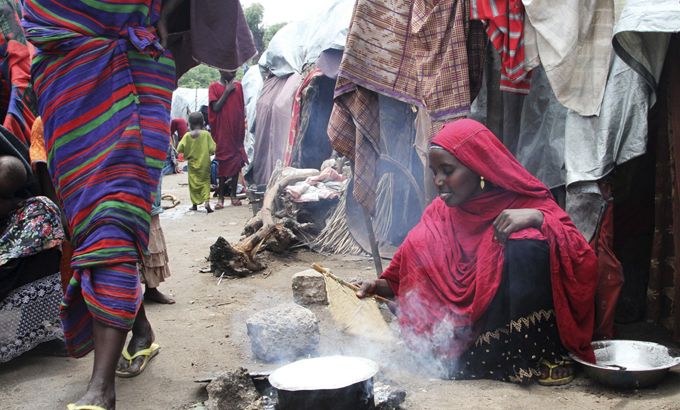Famine spreads to sixth region of Somalia
UN unit says tens of thousands, half of them children, have already died as famine conditions continue to spread.

Famine has spread to a sixth area of Somalia and tens of thousands of people have died as a result of severe food shortages, the UN has said.
A statement from the UN Somalia Food Security Nutrition Analysis Unit (FSNAU) in Nairobi, Kenya, said on Monday that data gathered in August suggested the Bay Region had been hit by famine in addition to several areas already declared famine zones by the UN.
Keep reading
list of 4 items‘Mama we’re dying’: Only able to hear her kids in Gaza in their final days
Europe pledges to boost aid to Sudan on unwelcome war anniversary
Birth, death, escape: Three women’s struggle through Sudan’s war
“August survey results indicate that the prevalence of acute malnutrition and the rate of crude mortality have surpassed famine thresholds in Bay Region of southern Somalia,” the statement said.
“Tens of thousands of people have already died, over half of whom are children.”
Famine was first declared in the southern Bakool and Lower Shabelle regions of southern Somalia in July.
It later spread to three further areas, including into the Somali capital, Mogadishu, and the Afgoye corridor, the world’s largest camp for displaced people.
The FSNAU conducted nutrition and mortality surveys across southern Somalia during July and August and found the most extreme levels of acute malnutition in Bay, it said.
Several other areas are at severe risk of tipping over into famine conditions, it added.
“The response to date has not been sufficient,” Tony Burns, of SAACID, told Al Jazeera.
“The international monetary crisis weighs heavily in the western and international community, and we’re just not getting the funds to make a systemic difference they need to dig deeper unless they want to see three, 400,000 people dead in the next quarter.”
Efforts to tackle the country’s drought crisis have been hampered by the country’s ongoing civil war.
Al-Qaeda affiliated al-Shabab fighters pulled out of positions in Mogadishu last month but they still control much of southern Somalia, the worst-hit region by famine and the extreme drought.
Famine implies that at least 20 per cent of households face extreme food shortages, acute malnutrition in over 30 percent of people, and two deaths per 10,000 people every day, according to UN definition.
Some 12.4 million people in the Horn of Africa, including parts of Ethiopia, Djibouti, Kenya and Uganda, are affected by the worst drought in decades in the region and are in need of humanitarian assistance, according to the UN.
Meanwhile in Mogadishu, Somali leaders are holding a rare three-day conference that began on Sunday in an effort to set up plans for a new government.
The current government, founded in Kenya in 2004 with a five-year mandate, is one of the more than a dozen attempts to form a central authority in Somalia since it plunged into war with the 1991 overthrow of President Mohamed Siad Barre.
But constant political bickering and the continuing conflict have thwarted efforts to draft a new constitution and hold elections.